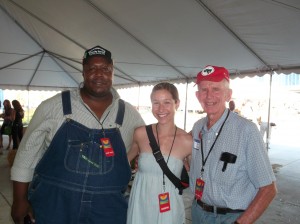Honorees Represent Communities Defending Their Human Rights to Food in the Face of Policies of Land and Water Grabbing, Migration, and Militarization
FOR IMMEDIATE RELEASE: September 9, 2014
 Des Moines, IA — The US Food Sovereignty Alliance (USFSA) is honored to name the Union of Agricultural Work Committees (UAWC) of Palestine, based in Gaza and the West Bank, and Community to Community Development /Comunidad a Comunidad (C2C) of Bellingham, Washington, as co-recipients of the 2014 Food Sovereignty Prize.
Des Moines, IA — The US Food Sovereignty Alliance (USFSA) is honored to name the Union of Agricultural Work Committees (UAWC) of Palestine, based in Gaza and the West Bank, and Community to Community Development /Comunidad a Comunidad (C2C) of Bellingham, Washington, as co-recipients of the 2014 Food Sovereignty Prize.
Their stories of continuous struggle to defend the rights of their communities – farmers and fishers in the occupied Palestinian territories and migrant Mexican farm workers in Washington State, both seeking to produce their own food, on their own land, in their home communities – stand in stark contrast to the storylines coming from agribusiness: that technological changes to crops can meet human needs and resolve hunger.
Palestine has been under Israeli occupation for decades and this summer faced heightened pressure, including thousands killed and many more injured from bombings, destruction of homes, schools, hospitals, farms, and fishing boats, and hundreds of arrests without due process, and the continued building of settlements on Palestinian farmland. UAWC builds farmers cooperatives and seed banks, and supports women’s leadership, while continuing to seek its members’ human rights to food, land, and water.
“This important prize inspires UAWC to carry on its work in defending Palestinian farmers’ rights against the brutal Israeli violations, both through supporting small-scale farmers and fishermen toward their food sovereignty and rights to land and water, and also through coordination with local and international movements for social justice and human rights,” said Khaled Hidan, General Director of the Union of Agricultural Work Committees in Palestine.
In Washington State, amid failed immigration policies that criminalize working families, Community to Community Development has supported and worked with immigrant farm workers to develop farm worker-owned cooperatives, organize a successful nutrition education project called Cocinas Sanas, and promote domestic fair trade in regional assemblies and meetings. Most recently, C2C has supported an emerging farm worker union, Familias Unidas por la Justicia, and organized a national boycott of Sakuma Farms, their employer, who withheld pay, provided poor housing, and has since retaliated against the workers. Familias Unidas por la Justicia recently won a settlement for wage theft and had a Superior Court Judge rule uphold their right to organize – but their fight is not over.
“In honoring Community to Community, the USFSA honors indigenous farmworkers in the U.S. Displaced by NAFTA, these peasant farmers from Mexico are practicing a tradition of struggle for justice. Together, C2C and Familias Unidas are promoting food sovereignty in rural Washington State and challenging the corporate agricultural interests that are controlling our food system,” said Rosalinda Guillen, Executive Director of Community to Community Development.
The Food Sovereignty Prize will be awarded on the evening of October 15in Des Moines, IA, at the Historical Building. The Food Sovereignty Prize challenges the view that simply producing more through industrial agriculture and aquaculture will end hunger or reduce suffering. The world currently produces more than enough food, but unbalanced access to wealth means the inadequate access to food. Real solutions protect the rights to land, seeds and water of family farmers and indigenous communities worldwide and promote sustainable agriculture through agroecology. The communities around the world who struggle to grow their food and take care of their land have long known that destructive political, economic, and social policies, as well as militarization, deprive communities of their rights. These are the root causes of want, hunger and poverty.
The USFSA represents a network of food producers and labor, environmental, faith-based, social justice and anti-hunger advocacy organizations. Additional supporters of the 2014 Food Sovereignty Prize include Iowa Citizens for Community Improvement, the Women’s International League for Peace and Freedom – Des Moines, and Occupy the World Food Prize, along with media sponsor EcoWatch.
For event updates and background on food sovereignty and the prize winners, visit www.foodsovereigntyprize.org. Also, visit the Food Sovereignty Prize on Facebook (facebook.com/FoodSovereigntyPrize) and join the conversation on Twitter (#foodsovprize)
CONTACT:
Adam Mason, State Policy Organizing Director
Iowa Citizens for Community Improvement
(515) 282-0484, [email protected]
Lisa Griffith, National Family Farm Coalition
US Food Sovereignty Alliance
(773) 319-5838, [email protected]



 Des Moines, IA — The US Food Sovereignty Alliance (USFSA) is honored to name the Union of Agricultural Work Committees (UAWC) of Palestine, based in Gaza and the West Bank, and Community to Community Development /Comunidad a Comunidad (C2C) of Bellingham, Washington, as co-recipients of the 2014 Food Sovereignty Prize.
Des Moines, IA — The US Food Sovereignty Alliance (USFSA) is honored to name the Union of Agricultural Work Committees (UAWC) of Palestine, based in Gaza and the West Bank, and Community to Community Development /Comunidad a Comunidad (C2C) of Bellingham, Washington, as co-recipients of the 2014 Food Sovereignty Prize.